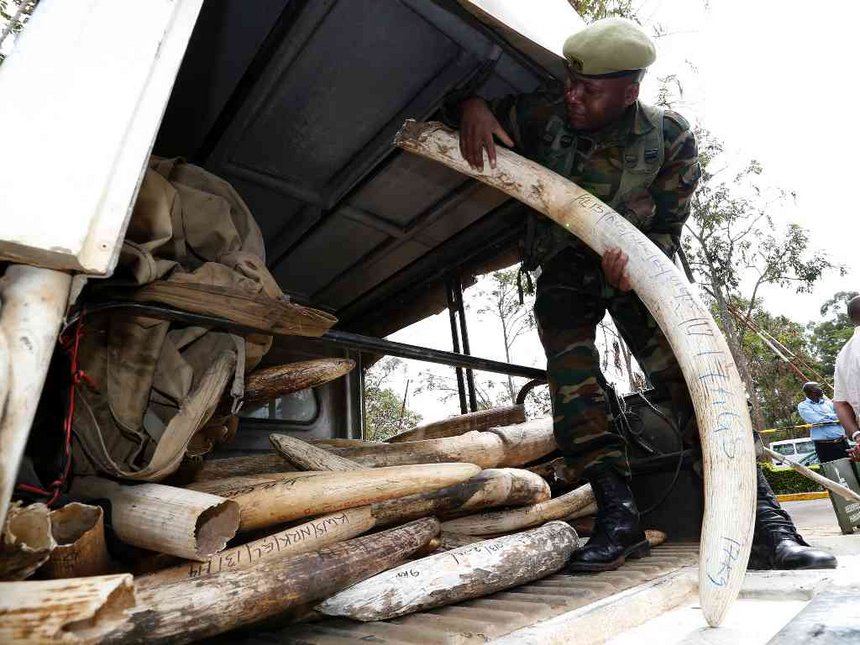Share this
A Kenya Wildlife Service personnel offloads 172 pieces of ivory and Rhino horn shipped from Narok county at the KWS headquarters in Nairobi, April 15, 2016. /JACK OWUOR
Kenya wins world support for global ban on ivory trade
Kenya’s bid for domestic ivory markets to be closed received a major boost from world governments, weeks ahead of a convention on endangered animals and plan.
More than 10,000 people from 192 countries, who will participate in the Convention on International Trade in Endangered Species of Wild Fauna and Flora, voted for this.
Kenya wanted African elephants listed in CITES Appendix I, generating heated debate on Saturday among several African countries opposed to it.
The European Union said in a document on July 1 that it opposed proposals to protect elephants, causing a major spat with NGOs.
Under the proposal, all African elephant populations and their range states will be unified under Appendix I, ending split-listing.
Elephant populations in Botswana, Namibia, South Africa and Zimbabwe are in Appendix II, meaning the countries can trade in ivory with permission from CITES.
The country submitted 14 proposals on the African elephant, African pangolins, snakes species endemic to Kenya, the Thresher shark, chameleon and plant species and others on measures to combat illegal wildlife trafficking.
Read: B attle lines drawn as Kenya seeks global ban on ivory trade
During the International Union for Conservation of Nature congress in Honolulu, Hawaii, experts expressed concern that the domestic markets could be creating opportunities for laundering illegal ivory.
Director general Inger Andersen said urgent action was needed to ensure the long-term survival of life on earth.
“Some of the world’s greatest minds and most dedicated professionals met here at the IUCN congress to decide on the most urgent action… and our planet’s ability to sustain us,” she said.
She added that the congress came at a pivotal time; when the planet’s history was at crossroads.
More than 100 resolutions and recommendations have been adopted by IUCN members – a unique global environmental parliament of governments and NGOs.
They called on third parties to take action on a wide range of urgent conservation issues.
Key decisions included closure of domestic markets for elephant ivory, the urgency of protecting the high seas, the need to protect primary forests, no-go areas for industrial activities within protected areas and an official IUCN policy on biodiversity offsets.
The IUCN congress which is held every four years helps shape the direction of conservation and sustainable development.
Experts believe shutting down domestic ivory markets will send a clear signal to traffickers and organised criminal syndicates that ivory is worthless.
During the congress new commitments took the Bonn Challenge initiative to restore 150 million hectares of degraded land by 2050.
With the latest pledges from Malawi and Guatemala, total Bonn Challenge pledges have exceeded 113 million hectares following commitments by 36 governments, organisations and companies.
Kenya seeks to restore 5.1 million acres of degraded
forests and landscapes by 2030 to take advantage of the global funds that developed countries will allocate to developing nations.
More on this: Kenya to plant ‘green dress’ size of Costa Rica in climate change fight
Kenya will present her case on banning ivory trade during the 17th CITES meeting to be held from September 24 to October 5 in Johannesburg, South Africa.
The next IUCN Congress will take place in 2020.
Source: The Star




















